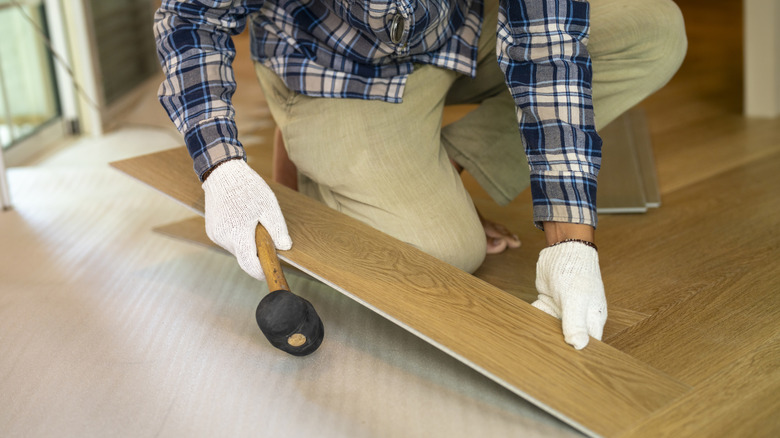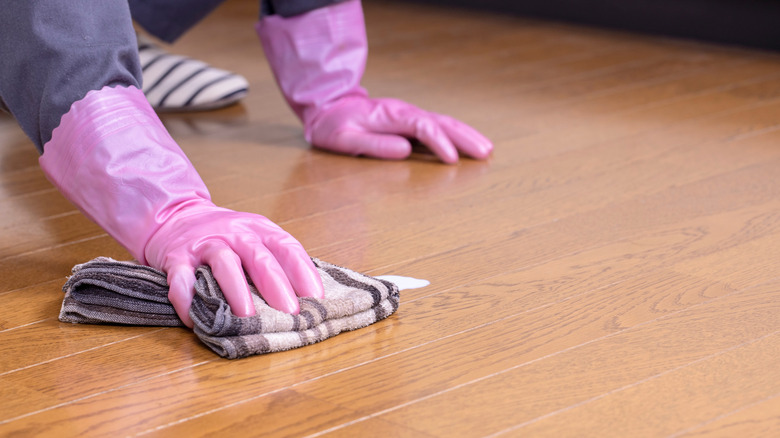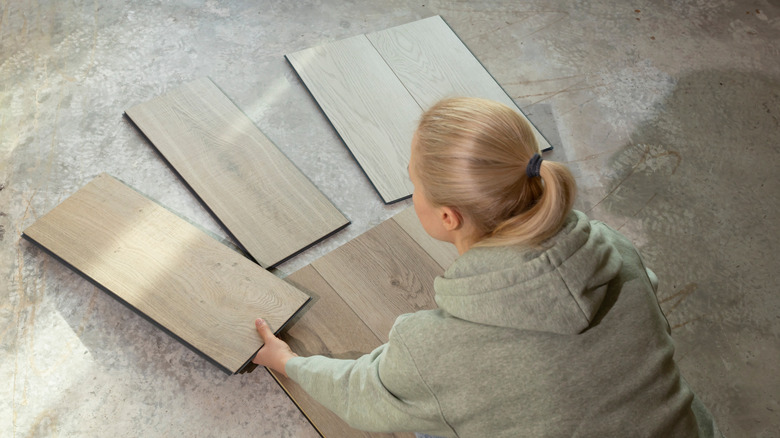The Vinyl And Limestone Combination Flooring You Have To Try
When searching for the best flooring options for your home, you might come across the usual vinyl, wood, tile, and marble choices. But there's another option you can try out if you want something that'll stand the test of time and won't be a pain to maintain. Say hello to SPC vinyl flooring. To understand it better and see how it compares to other kinds of vinyl floors, House Digest caught up with Skylar Bartlett, owner of Kreer Construction, for an exclusive interview. "SPC stands for Stone Plastic Composite, and it's a type of luxury vinyl flooring. The core is made from a mix of limestone and plastic stabilizers, which gives it that dense, durable feel," she explains.
Plus, you can choose between wood- and stone-looking varieties to ensure your flooring matches your home's aesthetic. Regarding its installation process, she says, "It installs as a floating floor using a click-lock system, and most come with a built-in underlayment, which helps with comfort and sound." In other words, you can install it yourself if you want to save money on labor. You won't even have to prepare the subfloor, provided your current flooring is level. "All in all, it's a practical option if you're dealing with moisture, pets, or just heavy daily use." And it is best "... for areas that need to handle water, wear, and traffic without constant maintenance." Despite its many pros, it's not without its fair share of cons. For instance, it's not the most comfortable to walk on barefoot. It's also more expensive than LVP, but it won't have as much impact as hardwood flooring on your home's resale value.
What are the pros and cons of SPC vinyl flooring?
Discussing the pros of SPC vinyl flooring in her exclusive interview with House Digest, Bartlett lists being waterproof as its primary advantage. "Like, truly waterproof — not just water-resistant. That alone makes it a go-to for bathrooms, laundry rooms, and basements." This means you won't have to worry about warps or water damage, even if you experience a humid climate. "It handles temperature changes better than a lot of other floors, which means fewer issues with gaps or buckling over time." Spills won't be an issue, either. You can easily wipe away coffee, wine, and muddy stains. "Sweep, mop, done. It doesn't need special cleaners or a bunch of upkeep." Additionally, its tough core makes it a pet-friendly flooring material. "The stone composite makes it more resistant to dents and impact than traditional vinyl. Great for rolling chairs, kids, or dog claws." Additionally, it's available in a huge variety of designs and patterns.
On the flip side, "It's more expensive than budget LVP but still usually cheaper than quality hardwood or tile." Be prepared to shell out between $3.5 and $7 per square foot, or up to $8 per square foot for premium quality. Plus, "It's not the softest floor to stand on for long periods." So, don't install it in areas "where comfort is the top priority, like a bedroom you're barefoot in all the time." Another reason is that it can feel cold "since the core is dense and doesn't retain heat ... unless you're pairing it with radiant heat or good rugs." Moreover, low-quality SPC offers average sound absorption. So, you might need to find a perfect rug for your space to help with these issues.
What makes SPC different from other common types of vinyl flooring?
Wondering how SPC differs from other common types of vinyl flooring? Bartlett explains the difference in her exclusive chat with House Digest. Pitting it against LVP, she elaborates, "SPC has a rigid core made from stone composite, while regular LVP (luxury vinyl plank) has a more flexible PVC core." This difference in composition "makes SPC more dent resistant and better at hiding subfloor imperfections." Being softer, LVP is "more prone to shifting or showing bumps underneath if the prep isn't perfect." Similarly, WPC (wood plastic composite) is relatively softer and would be more comfortable when walking barefoot, but it won't hold up as well in high-traffic areas.
She continues, "Sheet vinyl is softer, thinner, and usually glued down. It's more affordable, but also easier to dent or tear, and not great at hiding flaws in the subfloor." On the other hand, SPC is more durable, and its floating installation makes for easier replacement. Laminate is another common flooring type that SPC is often compared to. However, it isn't vinyl. It's "made from high-density fiberboard with an image layer and a protective topcoat" and isn't waterproof. "If water exposure is even a possibility, SPC is the safer choice," courtesy of its superior construction and performance. That being said, choosing the right wear layer thickness and paying attention to the built-in underlayment is important for the best performance. "For a typical house, you want to aim for a wear layer of at least 12 mm, but if you want extra durability, especially in high-traffic areas, go for 20 mm or higher," Bartlett concludes.


